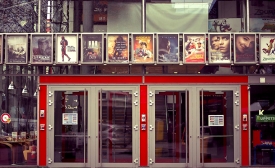minorities

"Cultural barometers" that analyze the representation of non-privileged groups in media can serve as tools for communicating with foreign audiences about inequality and violence.
The humid Tuesday evening wanes as Akeel Shaikh, 19, spews a blend of Hindi and Urdu commands into his cell phone, rounding up members of his Muslim political group from the narrow booth of a Mumbai bakery and milk bar.
Immigration policy was the first weapon used to punish Vladimir Putin and his cronies following their Crimean consumption. Travel sanctions were imposed and U.S. visas denied to a handful of Putin colleagues with the intended message being: You are criminals and unwelcome in the United States.
Radio Free Europe/Radio Liberty and the McCain Institute present a discussion on Russian Propaganda and Russian minorities in Eastern Europe.
A French government report has proposed a radical overhaul of the “assimilation” model which requires immigrants to abandon their culture for that of France, including ending the ban on Muslim headscarves in schools and naming streets and squares after notables of foreign origin. In response to fears over growing racism and ethnic divisions in the country, it recommends emphasizing the “Arab-Oriental” dimension of French identity, barring the media from mentioning a person’s ethnicity and promoting the teaching of Arabic and African languages in schools.
Just over two months ago, the Tamils went to the polls for Sri Lanka’s Northern Provincial Council elections with defiance, yet with a cautious sense of festivity. Military harassment of voters and party candidates had been thorough and brutally innovative throughout the campaigning; in addition to the typical battering of election monitors, cash-for-votes and widespread intimidation, government supporters had even printed a fake newspaper.
When discussing democracy in Israel, some people seek to distinguish between what happens within the Green Line and what happens beyond it – an undemocratic regime of occupation. They believe the occupation doesn’t weigh on Israel’s democratic character, both because it’s a temporary situation and because it has the distinction of taking place outside the state’s borders.
In a small park on the edge of old Istanbul’s Eminonu square, women sit begging, Syrian passports in their outstretched hands, “Please help in the name of God” on sheets of paper at their feet. In this bustling city, where fisherman line the shore of the Golden Horn and tourists mingle with traders in the alleyways of the spice bazaar, the war raging just over Turkey’s southern border feels very distant.







